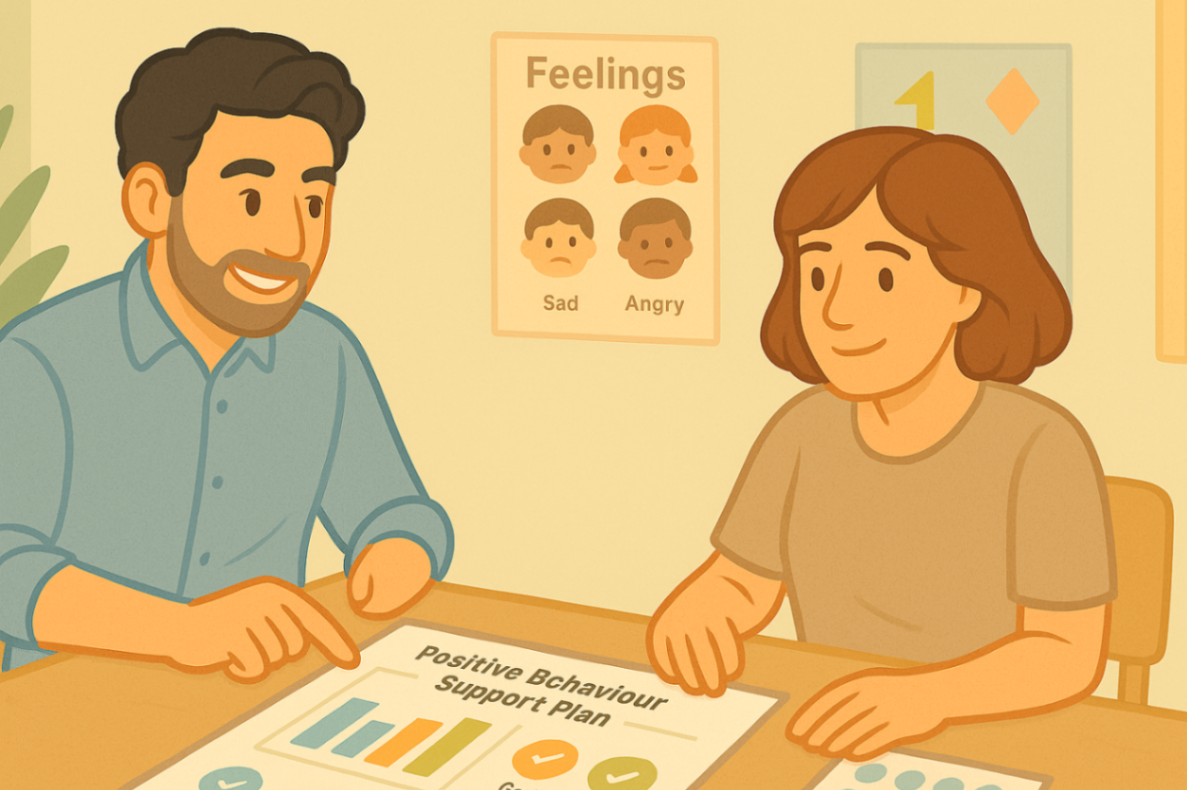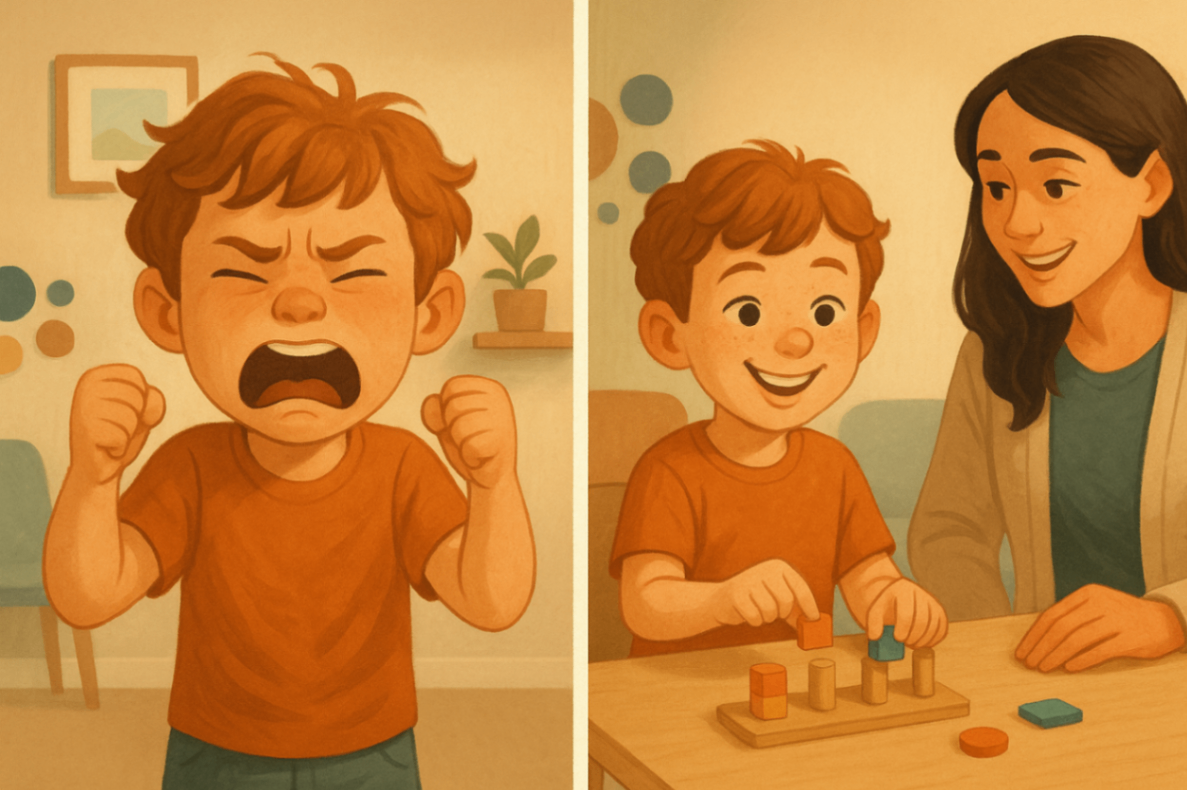
how specialised behaviour support helps with common challenges
19 June, 2025

Key Highlights
-
Specialised behaviour support helps children deal with challenging behaviours and developmental delays. It aims to make these issues more manageable.
-
Positive behaviour support (PBS) is an important part of ndis-funded therapy. It gives a clear plan that is made for each child and their needs.
-
When problems are spotted early, PBS helps improve the wellbeing and quality of life for children. It uses proactive strategies to bring about positive change.
-
Families, clinicians, and support workers all work together. Their goal is to make sure care plans are personal and give the best outcomes for every child.
-
The main focus is to help children build practical skills. This happens by using evidence-based interventions to make good, lasting changes.
Specialised behaviour support is all about making real improvements in children’s lives. Let's look into how this works step by step below.
Introduction
Every parent wants their child to have the best life. But dealing with challenging behaviours can be tough. Behaviour support gives families tools and ideas that help create positive change. These steps help make life better for kids. This kind of support looks at what causes some behaviour, and helps children grow and feel better.
For families in Liverpool, this is a good choice if you need NDIS help for your child’s growth and needs. Do you think this way of support could be what your family is looking for to boost the quality of life?
Understanding Specialised Behaviour Support in Australia
 Specialised behaviour support is very important for helping NDIS participants, especially children. It works by looking at the causes behind behaviours of concern, and not just what you can see on the outside.
Specialised behaviour support is very important for helping NDIS participants, especially children. It works by looking at the causes behind behaviours of concern, and not just what you can see on the outside.
PBS plays a big part in this approach. It lets people who help make special support plans for every person, so each plan fits what they need. In Liverpool and other nearby places, programs like DAAR’s give children more power and teach their caregivers good ways to help. This brings real and long-lasting change to the life of the child and their family.
Behaviours of concern and behaviour support are at the core of what PBS through the NDIS tries to do. With the help of tailored support plans, families get to feel more prepared and their children also get a way to do better both now and in the future.
What Makes Behaviour Support “Specialised”?
Specialised behaviour support varies for each individual and goes beyond regular care. It involves tailored strategies developed after assessing the person's behaviour. Providers focus on the child's specific challenges to create a plan based on Positive Behavioural Support (PBS) principles. This expert assistance aims to identify the root causes of difficult behaviours, leading to a customised support plan that requires consistent reinforcement. Families collaborate with the team to enhance the child's progress.
For example, if a child struggles with loud noises, the support plan may involve creating a quieter environment and introducing calming activities, alongside clear rules and routines. This approach reduces stress and improves emotional regulation. When experts combine knowledge with compassion in behaviour support, it enhances the child's long-term quality of life.
How the NDIS Aligns with Positive Behaviour Support
The NDIS helps its participants by giving money that fits well with Positive Behaviour Support (PBS) principles. This way helps cut back on restrictive practices and puts more focus on better wellbeing. By using tailored support plans, families can get the right help that matches their child’s needs.
Restrictive practices, like keeping a child away from others, are watched closely under NDIS rules. Behaviour practitioners work within these guidelines to keep these types of interventions to a minimum. The PBS approach, instead, uses proactive strategies such as skill-building and making changes to the environment.
The PBS method used by NDIS means children deal with fewer behaviour blocks. At the same time, they learn good tools to grow. This teamwork lets families choose their therapy options, making sure their children see real and lasting improvements in Liverpool and nearby places.
Signs Your Child May Be Struggling with Self-Regulation
Noticing signs that a child is having a hard time with self-regulation is very important for their growth. If you see the child have many outbursts, not be able to handle their feelings, or struggle to move from one routine to another, it could mean more is going on. These behaviours of concern are often seen in young people, and they can hurt their quality of life and how they get along with other people. Working with a behaviour support practitioner can help. This person can look at the child's behaviour through a functional behaviour assessment. With this, they can make tailored support plans that fit what your child needs. Doing this can help your child make positive changes and build important ways to cope.
Identifying Triggers and Early Warning Signs
Understanding triggers and early warning signs helps caregivers handle behaviours before they get worse. Here are some good ways to spot patterns:
|
Trigger |
Early Warning Signs |
|---|---|
|
Environmental changes |
Not wanting new routines or changes in places |
|
Sensory overstimulation |
Covering ears, staying away from bright lights |
|
Social interactions |
Pulling away from group activities or play |
|
Emotional distress |
More crying or shouting |
|
Academic struggles |
Trouble paying attention or following instructions in class |
Watching for these signs and using reflective practice helps families notice what may cause them. This can lead to better ways to help a child. When everyone works together to look for these signs, caregivers and helpers can give kids the support they need. This helps them feel good and do well with others.
Strategies for Calming and Self-Regulation
Helping children learn good self-regulation skills is very important. Here are some practical strategies you can use:
-
Include regular calming techniques like breathing exercises or music therapy.
-
Use consistent reinforcement and set clear routines to help lower unpredictability.
-
Offer sensory-safe spaces so children can take a break when they feel upset.
-
Teach practical skills, such as speaking up or finding ways to solve problems.
-
Pay attention to positive actions and praise effort, not just perfect results.
These interventions do more than just reduce difficult behaviours—they help children become strong when facing challenges. By using support strategies that fit each person, PBS gives both caregivers and children the tools they need for stability and growth.
When to Seek Support
Knowing when to get help can make a big difference for your child and their self-regulation skills. Signs like ongoing challenging behaviours, problems with social interactions, or a big drop in grades may mean it is time to look for behaviour support. It is good to work with a behaviour support practitioner because they use plans that fit your child’s needs.
Getting help early and taking part in professional development opportunities can lead to positive behaviour changes. This also helps improve your child’s quality of life and their overall wellbeing. In the end, this can lead to the best outcomes for your child’s development.
Book Personalised Emotional Behaviour Support Today
At daar, we create personalised support plans that are tailored to your child’s specific needs — not a one-size-fits-all approach. Our experienced behaviour specialists use NDIS-funded, evidence-based strategies to deliver real results for children and families across Liverpool.
If your child is experiencing emotional outbursts, developmental delays, or behaviour challenges that disrupt daily life, our team is here to help. We’re here to turn challenges into growth opportunities by building life skills, emotional regulation, and confidence — all in a way that’s supportive, simple, and structured.
Reach out today and discover how daar can help make your child’s life more meaningful, positive, and full of potential.
Conclusion
Specialised Behaviour Support helps children who have problems with their emotions and actions. It is important to know the signs and what can set these feelings off. This lets families take steps early and find good ways for the child to manage their feelings and actions. When families and experts work together, they can make a support plan that fits what the child needs. Remember, asking for behaviour support shows how strong you are, not weak. It can help both your child and your family in big ways.
Frequently Asked Questions
How does Specialised Behaviour Support differ from general support?
Specialised behaviour support is more than using general ways to help. It looks at hard behaviours with personal action plans for each person. Behaviour support workers do careful checks to find out why the behaviour happens. They use PBS to make plans just for you. These plans aim to help improve the quality of life and lower problem behaviours.
What role do families play in behaviour intervention planning?
Families play an important part in making a plan to help change behaviour. They know their child best and can share what the child needs and what the child is good at. When families take part, the plans fit the child better. This helps everyone work together and gives the child more support at home. It also helps to get better results for the child.
How does DAAR tailor support for children in Liverpool and nearby areas?
DAAR gives help that fits each person's needs by using ndis ways and by working well with local schools, health workers, and other people. Families living in Liverpool, Casula, and Moorebank get easy access to expert help. These good and specialist programs have been shown to get the best outcomes for young people who want to work through behavioural challenges.
What outcomes can families expect from NDIS behaviour support services?
Families can see better self-control, better ways to talk, and more independence for their children with NDIS behaviour support. These services also help families build better relationships. The support gives families clear plans to deal with challenging behaviours in a way that works for them. Behaviour support from NDIS can really make things better at home and help children do well.
.svg)

















